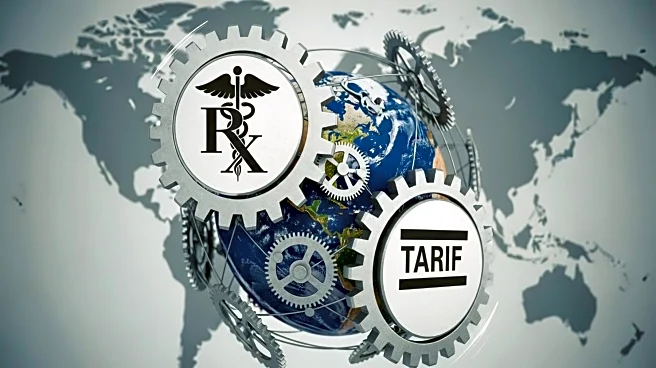What's Happening?
President Trump has announced a new tariff policy imposing 100% levies on imports of branded or patented pharmaceutical goods starting October 1, 2025. This move, communicated via social media, aims to encourage pharmaceutical companies to build manufacturing plants in the United States. The tariffs will not apply to generic drugs or companies that are constructing facilities in the U.S. The announcement has created uncertainty in the pharmaceutical industry, with experts questioning the clarity of exemptions and the potential impact on global trade. Major pharmaceutical companies, including Eli Lilly, AstraZeneca, Roche Holding, and GSK, have already pledged significant investments in U.S. production, potentially exempting them from these tariffs.
Why It's Important?
The imposition of these tariffs could significantly affect the pharmaceutical industry, particularly impacting countries like Ireland, Germany, Switzerland, Singapore, and India, which are major exporters of pharmaceuticals to the U.S. The European Union, which accounts for 60% of U.S. pharma imports, may face increased costs and supply chain disruptions. While the tariffs aim to boost domestic production, they could lead to higher prices for U.S. consumers and limit access to certain medications. The move may also shift generic drug production to Asian countries, which have a cost advantage over Western companies.
What's Next?
Pharmaceutical companies are likely to reassess their production strategies, potentially accelerating plans to build or expand facilities in the U.S. to avoid tariffs. The industry may face increased lobbying efforts to clarify exemptions and negotiate terms that minimize disruptions. Countries affected by the tariffs, particularly in the EU, may seek diplomatic solutions or trade agreements to mitigate the impact. U.S. consumers and healthcare providers will need to prepare for potential price increases and changes in drug availability.
Beyond the Headlines
The tariffs could lead to long-term shifts in pharmaceutical supply chains, with more companies investing in U.S. production to secure supply and reduce dependency on foreign imports. This policy may also spark debates on the balance between national security and global trade, as well as the ethical implications of access to affordable healthcare. The move could influence future trade negotiations and impact international relations, particularly with countries heavily reliant on pharmaceutical exports to the U.S.










